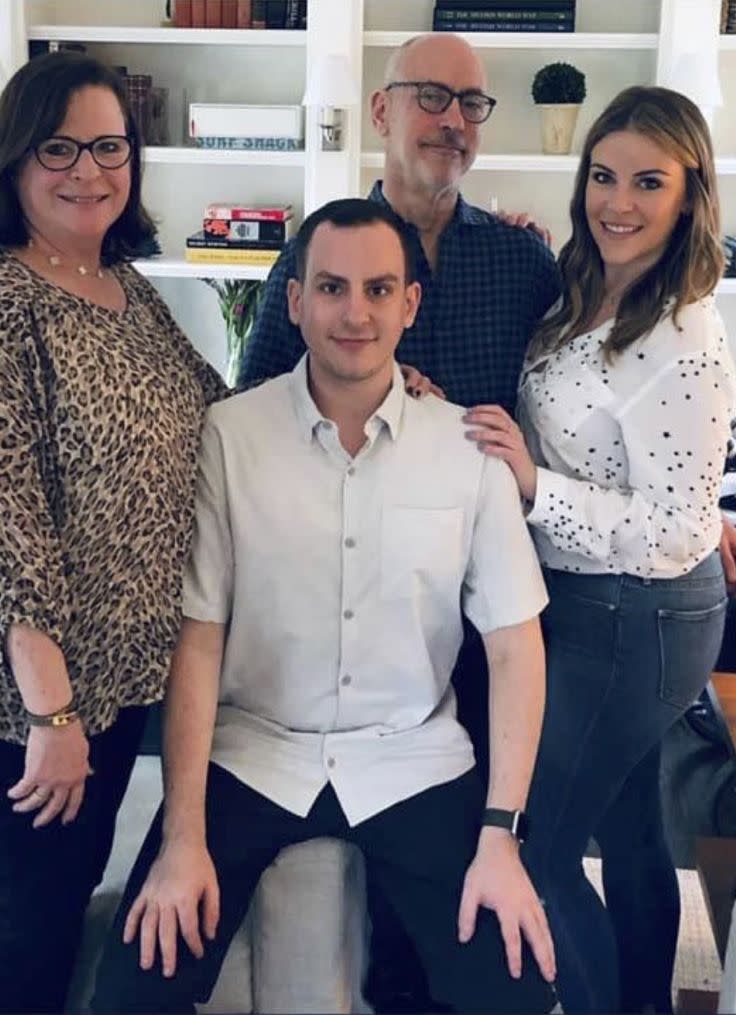Millennial Kids Are Moving Back Home — and Former Empty Nesters Are Readjusting

My daughter’s name pops up on my cell on the prophetic date of Friday, March 13 — it’s an actual phone call and not a text, so I know it’s something either wonderful or worrisome. “Mom,” she asks. “Can we come to you?”
The novel coronavirus epicenter of New York City, where she lives, is emptying out and the supermarket shelves have been stripped of toilet paper and Clorox wipes. “Yes,” I quickly reply. “Just get on a plane and we’ll figure it all out later.”
Two days later, my daughter and her wife, both in their 30s, walk into the family vacation home in southern Florida where I’ve been staying, officially joining the Spring 2020 Migration of the Millennials back home to Mom and Dad. We wave from across the room and they disappear into a bedroom to quarantine for 14 days. “Don’t worry,” my daughter-in-law calls out. “We’ll only be here for about two weeks.”
That was three months ago and counting as I write this in mid-June, and I’m so grateful that they were able to jump on that plane. Like ours, every family now has its own pandemic story — the specifics may differ but the theme is often the same: In the face of the unknown and when things get scary, if you can, you want to go home to be with family and huddle close (or from a safe distance of six feet).
When the frantic game of musical chairs that the pandemic started ended in lockdowns, everyone in my family had a safe place to hunker down, although we were temporarily divided in two. My daughter, daughter-in-law, and I are in Florida, where I had been working remotely as a freelance writer for most of the winter. My husband, who goes back and forth to Florida in the winter, had to remain in a northern suburb of New York City to run an essential business. Our 32-year-old son, who had been living in his own Connecticut apartment, joined his dad in late March to keep him company and help with the grocery shopping while continuing to work remotely.
This was not our first rodeo with a temporarily refilled nest. Where we live, it seems like some percentage of grown children are almost always living in their childhood bedrooms; rents in New York are astronomical and it takes time to find jobs and roommates and save enough to move out. And so our supposedly empty nest has rarely been empty — not counting the two childlike Labs who are in permanent residence. Our daughter spent some time at home lining up her city life after college. And after our son finished a three-year stint working abroad, he too moved back home while looking for a new position and apartment.
One thing I learned from these experiences is the importance of giving them space, not asking too many questions, and keeping things positive by not making any kind of comment that could be construed as criticism. (I’ve learned to ask “How are you?” instead of “What did you do today?” at night.) I also try to make liberal use of “thank you” for when they pitch in with chores and errands — basic polite behavior that can get sometime fall by the wayside when you’re living with anyone, be it child, spouse, or roommate, day in and day out.
Reasons for kids moving back home due to the pandemic vary and are usually some combination of safety concerns, economics, and/or desire for companionship and comfort. In most cases — and certainly my own — these are not young adults who have “failed to launch.” They are usually those in their 20s and 30s already skilled at adulting, with careers, 401Ks, dogs rescued from shelters, vegan chili recipes, and even spouses and babies.
Some, like Joni Cooper, 27, a product manager living in Manhattan, wanted the company of family and easier access to the outdoors — and the family’s Peloton — in her Harrison, New York childhood home. Others, like 24-year-old football coach Daniel Schwartz, had just moved to Georgia for a new job when his workplace shut down; not wanting to be alone in a new city, he temporarily moved back into his parents’ Miami apartment to work remotely.
Still others, like Will and Julia Whalen, a brother and sister both in their 20s who work in media in Manhattan, wanted to spread out — they could work more comfortably in their childhood bedrooms than they could in cramped or shared apartments. The Whalens even bought new desk chairs for their kids’ bedrooms when they returned home to Rye Brook, New York to work remotely. “Because they hadn’t used them in high school, preferring to work on their beds, we didn’t realize that they literally didn’t fit into their childhood desk chairs,” their mom, Patti Whalen, explains. “We upgraded to more executive-type models that were also better for their backs.”

As for my own experience and that of most of those I've talked to, it’s been going surprisingly well. And even though as a writer I'm used to spending lots of time alone, in this case, because of my constant low-level sense of anxiety about when the world will right itself, I know I’d be lonely without my temporary roomies (and my sweet grand-dog Gypsy). Of course, it hasn’t been all Instagram-perfect, whipping up chocolate chip banana bread or working on jigsaw puzzles. (The one I ordered is still sitting spilled out and unassembled on the kitchen table; I now regard it as more of a funky art installation.) We’ve had some fun movie nights — nothing scheduled — and eaten dinner together only occasionally. But for us, it works.
Our challenges have been minor and common, mainly surrounding the logistics (stocking up, cooking, cleaning, laundry, garbage removal, and the like) of running a combined household. While I haven’t posted a summer camp-like chore wheel, we all pitch in and it gets done — although maybe not to white-glove standards.
Others have gotten off to a rockier starts. Ariel Censor, 21, a 2020 college grad and her boyfriend, Simon Balukonis, 23, left their tiny downtown Philadelphia apartment because its location made social distancing and getting groceries difficult. Now, they're living with Censor’s family in a sleepy town in upstate New York. “Initially, we treated the kids like houseguests,” says Catherine Censor, Ariel's mom. “We quickly course-corrected to treating them like family, replete with chore assignments.” Jill Cooper, mom to product manager Joni, agrees. “There’s one suggestion I’d make to other parents,” she says. “If you’re thinking about doing your kids’ laundry at the outset, don’t!”

Another challenge regarding the refilled nest this time around is dealing with the uncertainty about when exactly the arrangement will draw to a close. In the past, when my kids found a job or apartment or saved up enough, they moved out. Now our living together is more open-ended and that brings its own set of issues and anxiety for all of us. It’s difficult to make plans when you’re not sure when going about regular life will be safer or you’ll have to return to a workplace.
Lisa S. Schwartz, M.A., a licensed marriage and family therapist based in Westport, Connecticut who specializes in helping families all over the country navigate transitions, calls setting boundaries the number-one most important skill to develop, even when arrangements are open-ended. She recommends holding family meetings to set out expectations for both parents and kids and to discuss any issues and thus head off possible confrontations or explosions.
To respect boundaries, Schwartz suggests, take time to step away, breathe, and process, before acting or saying anything. “Take a deep breath and count to 30 when you want to step in and micro-manage,” she recommends. “Don’t try to be the fixer. Kids want and need their parents to treat them as adults and not try to solve their problems.”
And cut your kids some slack, too. “It’s unchartered territory for all of us, and we’re all struggling,” says Schwartz. “So why do we expect them to have all the coping skills to navigate these murky waters?”
Parent Jessica Aronson, whose 25-year old daughter Remy, a marketing associate in DC, has been hunkering down in the family’s home since March 13, echoes Schwartz’ advice. “I’m just trying to be supportive and understanding," she says. "Our children are used to being independent and so coming back home can't be easy for them."
"Don't expect your child to be as they were as small children,” she adds. “They are adults now and just trying to find their way in a crazy world so give them space.”
As for our own family, both its northern and southern branches are thankfully healthy and remain grateful to have safe places to hunker down. Up North, our son is good company, says my husband. “He is very independent and helpful so it’s been an enjoyable experience.” When I pressed him for just one negative, my husband reluctantly shared that in a bit of role reversal, our son, a healthy eater, was nagging him about his very unhealthy eating habits (to which I say, good luck).
Before the pandemic hit, my husband and I had been talking idly about downsizing from the house in which we raised our kids. Now? Not so much. We’re happy to have the space, and we'll never know if we'll need it again. Meanwhile, our son is starting graduate school in Boston this September, but fall classes will be online. After his apartment lease ends this summer, he’ll most likely be living at home until moving up closer to campus makes sense. Maybe if he stays home long enough, in between his coursework he can work on nagging his dad into changing some other habits. I have some suggestions. But I’ll be taking a deep breath and counting to 30 before I share them with anyone.
You Might Also Like

